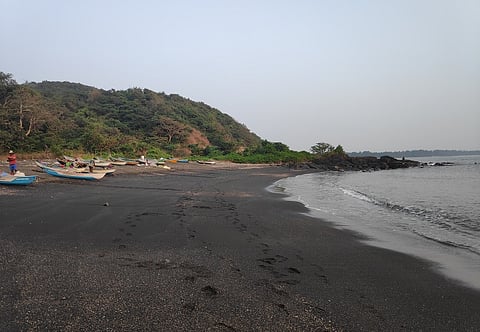

Manjunath spreads his arms wide in the warm evening air to describe the size of the waves that hit the beach during the monsoon.
“The waves are this big,” says the 32-year-old fisherman, before bending down to pick up the sand on the beach which unusually resembles black sesame seeds.
“The strong waves break down the rocks and that gives the sand its black colour,” says Manjunath, pre-empting the first question that comes to the mind when one reaches Tilmati Beach, around 13 km north of Karwar, and very close to the Goa border in Uttara Kannada district of Karnataka,
The black sand at the 150 metre shoreline is in complete contrast to the shimmering cream coloured sands that dot the rest of the beaches located on either side of Tilmati.
Tilmati gets its name from the Konkani word ‘tillu’ which means sesame seeds and ‘matti’ which means soil or mud.
.jpg?w=640&auto=format%2Ccompress)
Manjunath at Tilmati beach
Manjunath’s explanation of how the sand gets its characteristic black colour is not far off from the scientific explanation.
“The wave action in Tilmati is unique. Unlike other beaches, Tilmati is a cove formed between the rocks found at the beach, and the hillock at the shore," explains VN Nayak, a retired professor in the Department of Marine Biology at Karnatak University, Dharwad.
.jpg?w=640&auto=format%2Ccompress)
Rocks at Tilmati beach
According to him, the wave action on the black granite rocks found in Tilmati is the reason for the unusual black colour of the sand at the beach. “The high waves in the monsoon reach the hillock and are trapped on the beach because of the rocks. The waves forms a vortex and keep swirling in the beach area. This wave action on the black granite rocks makes the sand at the beach black in colour,” says VN Nayak.
Two kilometres south of Tilmati is a beach village called Majali where the sand is the regular cream colour. Similarly, in beaches to the north of Tilmati, across the Goa-Karnataka border in Polem, the sand is cream in colour.

“Tilmati is our little secret nestled in between the beaches of Karwar and Goa. One can find fishermen, locals and foreigners on the beach but the number of people visiting this beach is much lesser in comparison to nearby beaches,” says Ravi Teja, a journalist in Karwar.
According to historians, Tilmati was popular during the reign of the Marathas in the region. Later, it turned out to be on the border of North Canara and Goa, ruled by the British and Portuguese respectively before Indian Independence. "Due to its location, it was an important trade spot and the Portuguese built a well and an excise office there to facilitate the trade deals. The remnants of these are still found in this area," VN Nayak adds.
.jpg?w=640&auto=format%2Ccompress)
Tilmati Beach
Despite its history, visitors are infrequent at Tilmati today because reaching the beach involves a trek across a stream and a rocky hillock for around a kilometre. An alternative route involves crossing a bridge downstream and walking through a forest area. This effectively means that the beach is inaccessible during the monsoon season.
In 2017, a tourism project proposed the construction of a small bridge and railing at the Tilmati beach trekking point but it was shelved after the forest department refused to give permission for it. Uttara Kannada Deputy Commissioner Harish Kumar said that the district administration plans to keep Tilmati Beach untouched. “There will be no changes and we are going to keep it as it is. It will remain a spot where tourists can trek and reach the beach,” Harish said.
.jpg?w=640&auto=format%2Ccompress)
Sunset at Tilmati Beach
The breathtaking view of the sunset over the Arabian Sea, while idling on the very rocks that give the sand its unique colour, makes the short trek well worth the effort.